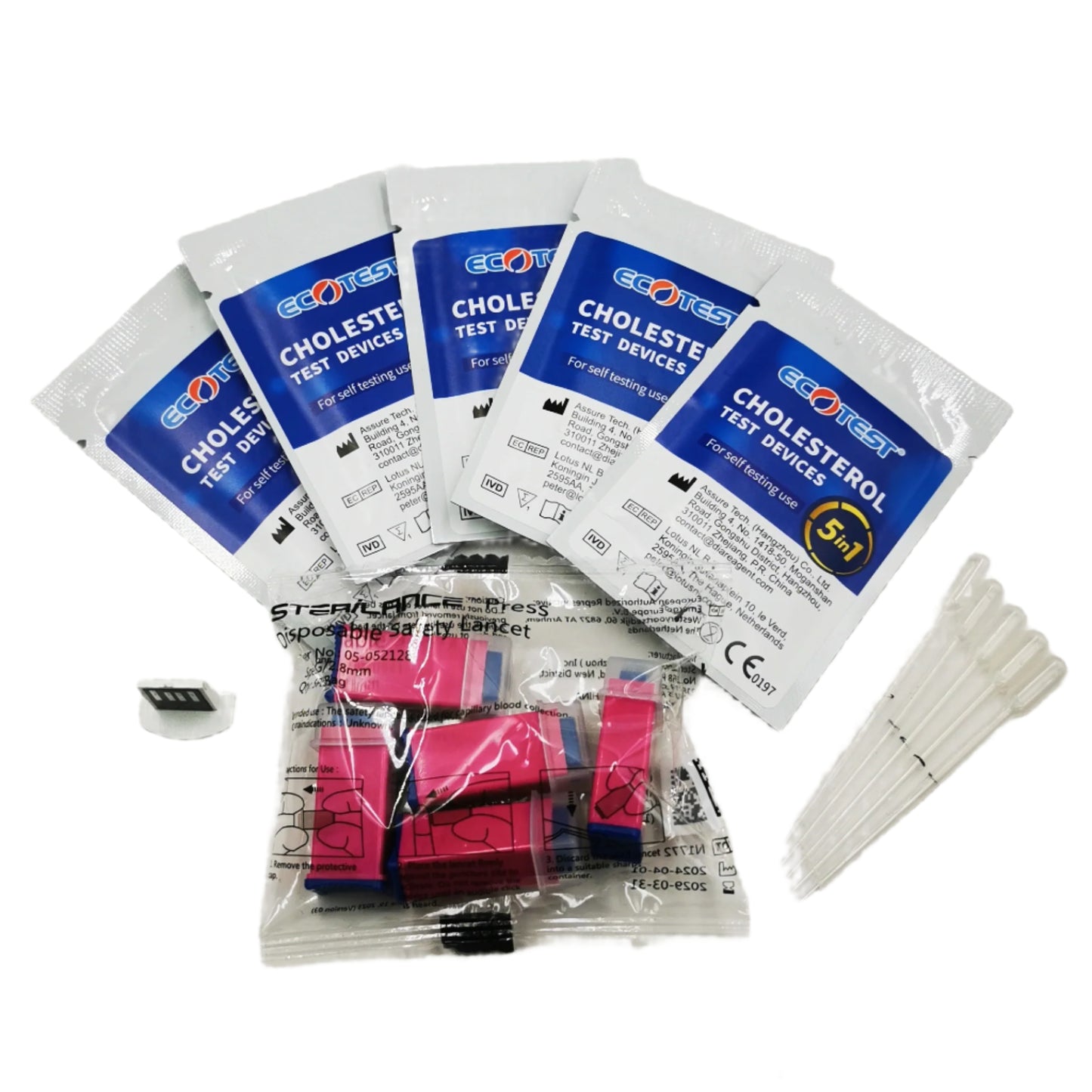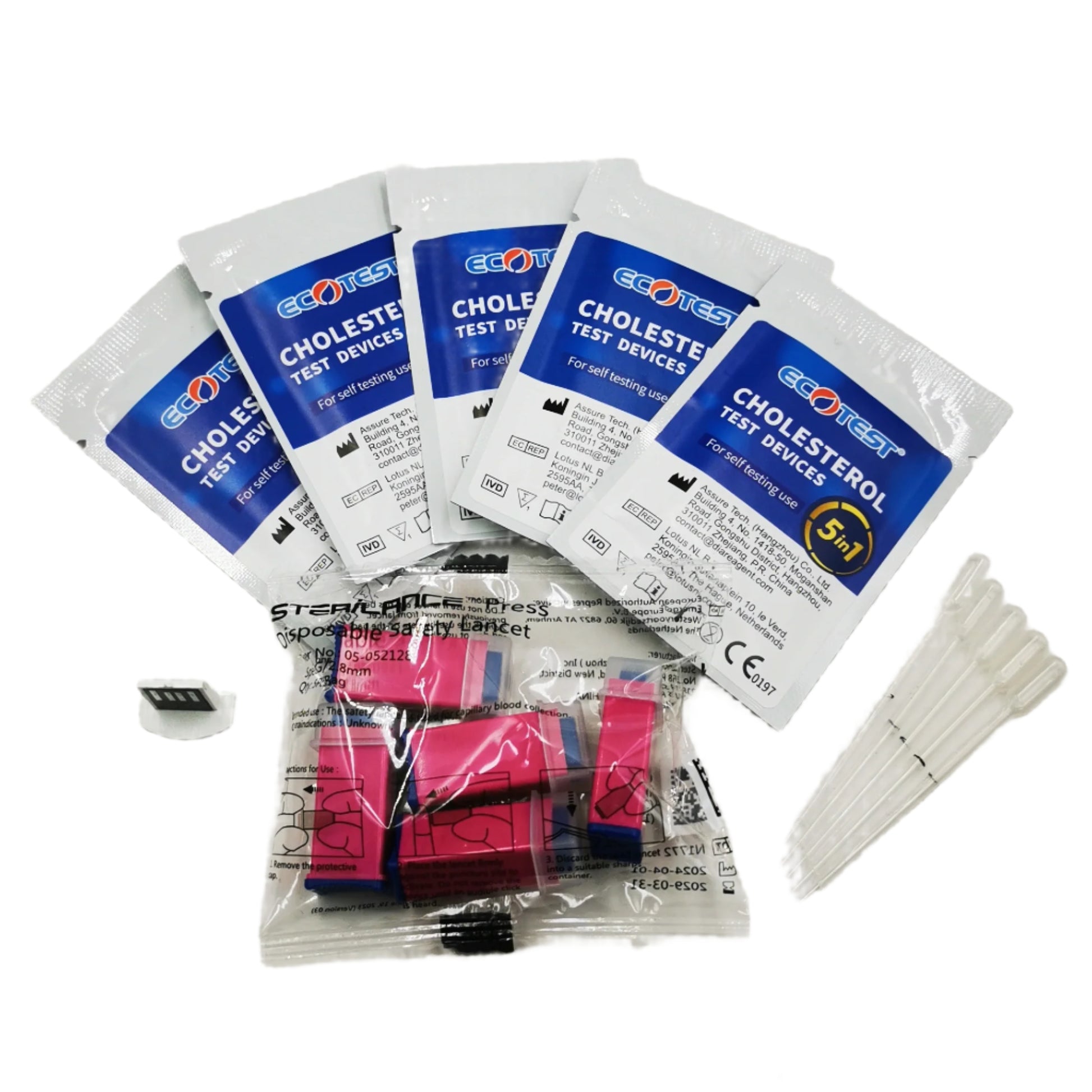Valuemed
5 EcoTest Cholesterol Test Devices Lancets + Pipettes Special Offer Expiry August 2025 (Ecotest cholesterol meter required to use these)
5 EcoTest Cholesterol Test Devices Lancets + Pipettes Special Offer Expiry August 2025 (Ecotest cholesterol meter required to use these)
Low stock: 5 left
Couldn't load pickup availability
5 EcoTest Cholesterol Test Devices safety lancets transfer pipettes for use with Ecotest Cholesterol tests
We have a small number of special offer cholesterol test devices available in packs of 5 for use before end August 2025
Contents included
- 5 EcoTest test Devices
- 5 x Safety lancets
- 5 x 35U/l Transfer Pipettes
- 1 x Code Chip
Watch our user guide on how to get a great sample for accurate test results
Share

Collapsible content
How to interpret your EcoTest Cholesterol Test Results
Ecotest Cholesterol Meter Results
The Ecotest Cholesterol meter displays 5 results for each completed blood test. Results are displayed in one of 2 scale options you can select, mmol/L or mg/dL. In the UK most cholesterol level results will be given in mmol/L.
Below are the minimum and maximum levels that the ecotest cholesterol meter is able to measure
- Total Cholesterol : 2.59-12.93 mmol/L (100-500 mg/dL )
- HDL Cholesterol : 0.39-2.59 mmol/L (15-100 mg/dL)
- LDL Cholesterol : 2.20-10.43 mmol/L (85-400 mg/dL)
- Triglycerides : 0.51-7.34mmol/L (45-650 mg/dL)
- Ratio of Total Cholesterol to HDL
Total Cholesterol
A normal Total Cholesterol level is below 5.0 mmol/L (200mg/dL) Above 5.0 but below 6.18 mmol/L is considered borderline elevated. Above 6.20mmol/L is considered high.
A high total cholesterol level can increase your risk of cardiovascular disease. However, decisions about when to treat high cholesterol are usually based upon the level of LDL or HDL cholesterol rather than the level of total cholesterol.
Total cholesterol levels can be tested at any time of day but the LDL and Triglyceride levels can vary depending on what has been recently eaten. For this reason, fasting (9-12hr) total cholesterol measurement is preferred by most doctors where either of the above two is elevated.
HDL
HDL or High-Density Lipoprotein is a good element and levels of over 1.55mmol/L (60mg/dL) are excellent. Levels between 1.00 mmol/L and 1.55 mmol/L are normal. Below 1.0 mmol/L are unhealthy. Men tend to have lower HDL levels than women 1 versus 1.2 mmol/L an ideal to aim for is 1.4 mmol/L
LDL
LDL or Low-Density Lipoprotein Cholesterol often referred to as bad cholesterol increases cardiovascular disease risk and Levels should be kept below 3.0 mmol/L
Triglycerides
High triglyceride levels are also associated with an increased risk of cardiovascular disease.
Triglyceride levels are assessed as follows:
●Normal – Less than 1.7 mmol/L (150 mg/dL)
●Mildly increased – 1.7 to 5.6 mmol/L (150 to 499 mg/dL)
●Moderately increased – 5.6 to 10 mmol/L (500 to 886 mg/dL)
●Very high – Greater than 10 mmol/L (886 mg/dL)
If your Cholesterol levels are abnormal we can not give personal or medical advice, so please discuss the findings with your Doctor, Nurse, or Pharmacist.
Should I do a fasting or non-fasting cholesterol test?
If your Total Cholesterol levels are in the normal range there is usually no need to test after fasting.
However, if your results indicate an elevated total cholesterol or high level of Triglycerides, over 1.7 mmol/L, then it is best to move to cholesterol testing after fasting for between 9 and 12 hours. This can easily be achieved by not eating after 7 pm and testing first thing the following morning.
Are there any medical conditions which would prevent me getting accurate cholesterol results?
Yes there are a few medical conditions and drug supplements that can interfere with your cholesterol test results.
Please consider the following if you are not getting consistent or accurate readings with your cholesterol meter:
- High dose Vitamin C. Ascorbic Acid supplements, often as part of multivitamins or taken on their own will interfere with results. If they are not prescribed and it is possible to stop taking Vitamin C in high dose, cholesterol testing can be resumed after 7 days.
- High Bilirubin levels in the blood will interfere with cholesterol test results. The level may be below that required to cause clinical jaundice. Raised bilirubin levels in the blood can occur in many medical conditions including anaemia, cirrhosis, following a blood transfusion, Gilbert syndrome—a common, inherited condition in which there is a deficiency of an enzyme that helps break down bilirubin, viral hepatitis, gall bladder disease, as a reaction to drugs (including statins) and in alcoholic liver disease.
- High urate levels can result from renal disease and early kidney failure but can also be caused by many other things including dehydration, diuretics (water retention relievers), drinking too much alcohol, drinking too much soda or eating too much of foods that contain fructose, a type of sugar, high blood pressure (hypertension), Immune-suppressing drugs, Leukemia.
- Haemolysis, the breakdown of large numbers of blood cells. Routinely follows a blood transfusion, but can also occur after trauma, surgery, and in a range of blood and bone marrow diseases.
With the exception of Vitamin C and prescribed drugs, most of the above will require medical investigation to confirm the underlying cause, but is worth considering if the cholesterol meter check device test is normal and the lancing technique, sample collection, and procedure are all correct. Please just don't blame the meter, or ignore the results, the problem may in fact be you! It could be something that you are taking or that you have an underlying medical condition that you may be completely unaware of!
How do I know if the cholesterol meter is accurate ?
While learning to use the cholesterol meter it is not uncommon for results to vary considerably between tests.
Here is a list of tips on getting consistently accurate results from your cholesterol meter:
1) Always lance the side of the finger, never the flat surface or pulp. The side of the finger is far more vascular and bleeds profusely. Wipe the first drop away and allow a large second drop to form naturally, without squeezing the finger. This technique is critical in getting accurate results. A bad lance technique is the main cause of wildly fluctuating results.
2) Dont expect the total cholesterol levels to be the same each time. Cholesterol levels have a diurnal variation and are naturally dynamic, see 3.
3) If your Triglyceride level is above 1.7mmol/L then you should move to testing while fasting as the Triglyceride levels will vary with meals and significantly affect the other readings on your meter.
4) You can check the meter function using one of the Test Devices supplied with the original meter starter pack. We have embedded a video demonstration of a device test in the product listing above.
5) Exclude medical and medication causes for the unexplained results, see below..
Can you give me any tips on obtaining the finger prick blood sample?
Obtaining a good finger prick blood sample is crucial to getting accurate results with any home blood test. We have created a video for each product which shows a great demonstration of exactly how you should be using the lancets and test provided, and the prep needed to perfuse the fingers.
We have put together our top tips on performing a finger prick blood test to help you here

